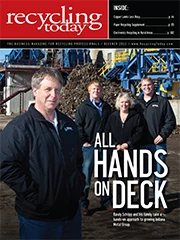BIR Nonferrous Division Denounces Protectionist Measures
In the current “fragile” economic environment, some nonferrous metals processors are complaining of “a lack of material to process,” while consumers “are feeling pain at the prices they need to pay for our scrap to feed their furnaces,” Robert Stein of Alter Trading, St. Louis, told attendees of the Bureau of International Recycling (BIR) Autumn Round-Table Sessions in Barcelona in late October.
Stein is president of the BIR Nonferrous Metals Division.
During his presentation, he said, “Consumers around the world need to understand that the international flow of scrap metal is not what is currently making scrap expensive; it’s a combination of underlying metals values coupled with a lower level of supply that is making a marked and negative impact.”
The scrap industry depends on the ability to buy and sell its material “without the barriers of protectionism that many of our established domestic consumers promote,” Stein told attendees of the Nonferrous Metals Round-Table meeting. “Our scrap does and should continue to find its highest value at the discretion of the seller and not by government regulations brought on by those who would seek in many ways to detract from our freedom to do so,” he added.
Protectionism has been a particular concern for the BIR’s International Trade Council, but its chairman, Robert Voss of Voss International in the U.K., opted to focus on the increasing problem of metals theft and fraud. Many insurance companies have shown understanding to date but it is likely to be “only a matter of time,” he warned, before they start to impose restrictions or higher costs on their clients in the metals recycling sector.
With analysts believing GDP (gross domestic product) growth in China could have been at a 20-year low of 7 percent in the third quarter, all of the country’s metals consumers have been adopting a “wait-and-see” attitude, said Andy Wahl of Newell Recycling of Atlanta in his review of world markets. In India, too, industry and the overall economy “are facing some contraction.” From Mexico, meanwhile, there are rumors that VAT (value-added tax) might be increased from 16 percent to 20 percent—a move that could lead to the distortion of local scrap prices.
The BIR Nonferrous Metals Division has commissioned CRU Strategies, the international management consulting division of the CRU Group, to gather statistical data on nonferrous metals scrap flows, in particular for copper and aluminum, and some of the early findings were shared with delegates in Barcelona by the company’s Managing Consultant Christopher Stobart. Stobart contended that the scrap industry within China will grow and, therefore, that international scrap traders will ultimately need to look for “new, growing export markets,” such as in India, Brazil and Southeast Asia.
Stobart ended on a positive note by suggesting, “The scrap industry can only become more important as the years go by in comparison with the primary mining, smelting and refining industry.”
Norberto Vidaña, European Union aluminum purchasing manager at global component producer Nemak, spoke about the procurement strategy for the automotive casting industry. He said China’s emerging middle class would “drive” the increase in global light vehicle sales.
BIR Appoints General Manager
The Bureau of International Recycling (BIR), Brussels, has named Alexandre Delacoux as its new general manager. The association says Delacoux has been assigned “to strengthen the BIR team in Brussels.”
Delacoux began working with the BIR on a part-time basis in early October 2012. His initial project will be to lead an internal BIR fact-finding mission during the fourth quarter of 2012. Delacoux will start working full time with BIR at the beginning of 2013.
According to his LinkedIn profile, Delacoux has a public relations and communications background and previously served as executive director at Brussels-based European Biopharmaceutical Enterprises (EBE), a trade association representing companies in Europe that produce biopharmaceutical products.

Explore the December 2012 Issue
Check out more from this issue and find your next story to read.
Latest from Recycling Today
- AF&PA report shows decrease in packaging paper shipments
- GreenMantra names new CEO
- Agilyx says Styrenyx technology reduces carbon footprint in styrene production
- SABIC’s Trucircle PE used for greenhouse roofing
- Hydro to add wire rod casthouse in Norway
- Hindalco to invest in copper, aluminum business in India
- Recycled steel price crosses $500 per ton threshold
- Smithers report looks at PCR plastic’s near-term prospects





